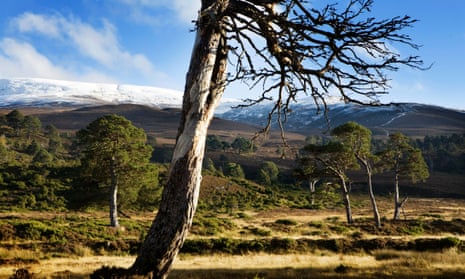A couple of summers ago, I strolled through Glen Feshie, wondering why this beautiful corner of the Cairngorms didn’t feel British. Ah, that’s it: little Scots pines poked through the heather alongside baby willows, dog rose, black grouse and other burgeoning signs of life.
I grew up enjoying the bare majesty of the Lake District. Our treeless uplands are, to me and most other people, completely normal. In times of bewildering change, in everything from politics to the climate, we cling to normality. This must be why Mountaineering Scotland has allied with its normal foe, the Scottish Gamekeepers Association, to criticise the Scottish government’s plan to increase the country’s forest cover from 17% to 25% by 2050.
The gamekeepers fear losing their normal business of deer stalking and grouse shooting. The mountaineers fret that tourists enjoy Scotland’s normal landscape and not “miles-long wanders through woods”, as Neil Reid from Mountaineering Scotland put it.
Following an outcry from members about this apparent opposition to trees, Mountaineering Scotland has acknowledged that allowing native forests to return is a positive move.
Trees aren’t intrinsically good. Covering another 8% of Scotland with lifeless industrial blocks of non-native plantations won’t meet government goals of enhanced landscapes, richer wildlife or more jobs. Modern mechanised forestry is not a big employer. Arguments about relative tree cover – Norway, the most comparable northern European country, has 33% tree cover; Finland 73% – aren’t totally convincing, as there’s something to be said for abnormality. Perhaps the treeless, denuded Scottish landscape is a unique selling point.
But people fearing the extinction of normality should go for a walk through Glen Feshie (rewilded by the Danish clothing billionaire Anders Holch Povlsen, who owns more than 200,000 acres of Scotland – more than the Queen) or visit Trees for Life, recreating native Caledonian forest in the Highlands. These are landscapes bursting with life.
The mountaineers will still have their views (magnificent peaks tower above any natural tree line), and hunters will have more wildlife to kill, if they really must (Finland’s forests support 300,000 hunters; Norway shoots more grouse than Scotland). This new normal will be better for everyone.
Let sleeping bears live
It’s probably not the first question on everyone’s lips, but how will the Trump presidency treat animals? His first test comes now because the US House of Representatives has overturned a federal ban on the barbaric shooting of hibernating bears and wolf families with pups. Most shockingly, members voted to lift this ban in Alaskan wildlife reserves.
Unlike his trophy-bagging sons, Trump prefers golf to pulling the trigger on bears or wolves, but given his distaste for environmental regulations, and enthusiasm for a wall that threatens 111 species, we can’t really hope he’ll intervene to save the bears.
Colour of my summer
Out of my study window I’ve just seen the slow flight of my first butterfly of the year: a lemon yellow brimstone, meandering along an ivy-filled hedge by an industrial estate.
According to Tove Jansson’s Moomintroll, the colour of your first spring butterfly shapes your summer. White betokens a quiet season, and gold will be wonderful; but dark ones, such as the red admiral, are best not spoken of. In the Moomintroll schema, yellow is pretty lovely.

